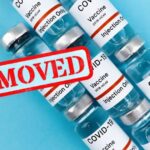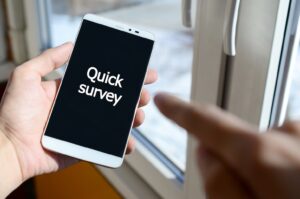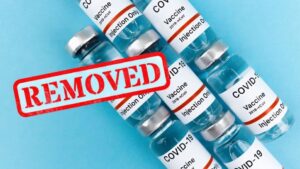
By LINDA BOYLE
Years ago, the late President Ronald Reagan famously said, “The nine most terrifying words in the English language are, ‘I’m from the government and I’m here to help.’”
Those words ring true when we look at the government’s past Covid response and its continued response.
Glenn H. Reynolds authored an article for the New York Post where he acknowledged he had been a covidian at the beginning of this pandemic and now realizes he made a mistake. (For context, Reynolds is a distinguished professor of law at the University of Tennessee).
Reynolds stated the initial death rates announced in the news were in a range of 4% to 10% which was the reason for his concern.
But then he learned the mortality rate was much lower and deaths were mostly seen in those who were obese, had heart failure or diabetes, or were elderly — or had a combination of these conditions. He added these deaths were probably accentuated by the over-aggressive use of ventilators.
Reynolds also realized that neither the lockdowns nor maskings did any good—although “they caused a lot of trauma, inconvenience and colossal economic destruction”.
He also cited how New York Gov. Mario Cuomo moved contagious people back into nursing homes where there were a lot of vulnerable people. Reynolds’ conclusion was how the government responded to Covid was probably worse than the disease itself.
The public health bureaucrats didn’t consider that all their draconian actions would cause a horrible effect on society, jobs, education, and mental health, to name a few. Their only focus was to “stop the spread” —not that anything they did really accomplished that. Four years later Covid is still alive and well; and the government is continuing to peddle the same old solutions that didn’t work the last time around.
And they wonder why we don’t trust them.
Four years later the damage is remarkable and the people responsible for that damage haven’t been held accountable. To make it worse, many of them flouted the rules they forced on us by going to dinner parties, fund raisers, ignoring social distancing and those dang mask mandates that were good for the peons, but somehow not needed for the elite unless being used for virtue signaling.
Scott W. Atlas, Steve H. Hanke, Philip G. Kerpen, and Casey B. Mulligan published a four-year post Covid retrospective review. These researchers wrote this report “from a balanced perspective that includes health, economic, educational, and civil liberty considerations.”
Perhaps you remember Dr. Atlas. He had been an advisor to then-President Donald Trump and was on the White House Coronavirus Task Force. Drs. Anthony Fauci and Deborah Birx did not agree with him and said he was passing out “dangerous” misinformation. They said they could not work with him.
Dr. Atlas was against lockdowns, questioned mask wearing, and pushed for kids to be able to return to school. He resigned from his position. In retrospect, looks like he might have been right. At the time his thoughts were considered heresy.
The 10 key lessons Atlas and others came up with look very similar to other lists we have recently seen. They are as follows:
Lesson #1: Leaders Should Calm Public Fears, Not Stoke Them. This should be number one as all others that followed were based purely on this idea of making people afraid. Sadly, what would have been more helpful would be to calm fears and allow normal social functioning as much as possible.
Lesson #2: Lockdowns Do Not Work to Substantially Reduce Death or to Stop Viral Circulation. There are non-covid excess deaths caused by these lockdowns and panic of about 100,000 per year in the United States—with zero seen in the non-lockdown country of Sweden.
In a peer-reviewed literature review concerning lockdowns by Herby, Jonung, and Hanke, they found “lockdowns in the spring of 2020 had a negligible effect on COVID-19 mortality.” Social distancing, however, may have helped.
So, it would seem a better strategy would have been to tell us the truth, let us know about the real risks and allow us to make our own decision. That was not an option.
Lesson #3: Lockdowns and Social Isolation Had Negative Consequences that Far Outweighed Benefits. According to the World Bank, “Mobility restrictions, lockdowns, and other public health measures…produced the largest global economic crisis in more than a century.” Besides all the ones previously identified, the impact on employment was huge. Over 49 million Americans were put out of work with two million still out of work in July 2022 according to Bureau of Labor Statistics survey data.
The National Bureau of Economic Research looked at the long-term impact of Covid on unemployment and its effects on life expectancy and mortality rates.
Covid effects were two to five times higher than other unemployment episodes—and will lead to “8 million additional deaths over the next fifteen years”. They believe the effect will be higher in women and in Afro-Americans.
Lesson #4: Government Should Not Pay People More Not to Work. Once it forced people out of work and created a crisis, Congress decided to give $600 per week unemployment bonuses early in the pandemic, even though they were warned the consequence of that decision would lead to “prolonged unemployment and associated economic underperformance.”
Once that bonus ended, unemployment rates plunged.
Lesson #5: Shutting Down Schools Was a Major Policy Mistake With Tragic Effects on Children, Especially the Poor. It was known as early as spring/summer of 2020 we should have left schools open. Children weren’t that affected by Covid and didn’t seem to be spreading it. “But teacher unions pressured authorities to close schools.”
No one can argue the negative effect this had on our children in school districts that succumbed to the teacher unions’ demands. No in-person learning led to a serious decrease in children’s test scores, kids dropping out of school, drug abuse, mental illness, suicide thoughts and unfortunately “300,000 cases of child abuse unreported in spring 2020.” The greatest harm was done to lower income and minority students.
Lesson #6: Masks Were of Little or No Value and Possibly Harmful. No high-quality information existed in the spring of 2020 to support masking. Randomized trials of masking for the flu showed masks were ineffective for protecting you and stopping the spread. Rather than doing studies to determine the effectiveness of masking, the government overstated the benefits even when data to the contrary was produced. The mindset that you need to mask still exists today and is already starting to make its rounds again.
Lesson #7: Government Should Not Suppress Dissent or Police the Boundaries of Science. Boy is this a big one! No dissent was allowed. No difference of opinion was tolerated. There was a horrible interplay among the MSM, Big Tech, so-called trust the science and public health community. There was censorship on opposing ideas at every level of society. This was totally anti-science.
Anthony Fauci, Director of National Institute of Allergy and Infectious Diseases made it impossible to get a different message out other than the one “they” had agreed to. And to make it worse, they failed to “run high-quality trials of repurposed drugs and non-pharmaceutical interventions.” This would include repurposed drugs such as Ivermectin and Hydroxychloroquine.
Lesson #8: The Real Hospital Story Was Underutilization. What the authors meant by this is with very few exceptions medical procedures during this time frame were canceled and people canceled potentially lifesaving medical care out of fear of going to the hospital. This was viewed by the authors as a probably significant contributor to non-COVID excessive deaths in the US.
Lesson #9: Protect the Most Vulnerable. The main goal should have been to protect the most vulnerable instead of a broad brush that included the entire population. This could have led to prioritization of limited resources. And I believe there would have been much less fear in the general population.
Lesson #10: Warp Speed: Deregulate But Don’t Mandate. Yes, we developed multiple monoclonal antibody treatments and vaccines in record time, but there were multiple failures. The government only had one solution and NIH failed to look at randomized trials of low-cost repurposed drugs. Then the government got involved in deciding who would get the monoclonal antibodies and that “created chronic shortages and politicized distribution decisions”.
Nor was the safety of the new vaccines thoroughly evaluated–with an overstatement of the benefits being the driving force for deployment. We had an all-out “vax everyone” campaign including mandates that undermined informed consent.
Conclusion: Limit Government Emergency Powers and Earn Back Public Trust. Many possible solutions were suggested by the authors that included action from Congress concerning future pandemics. However, the bottom line was this: “Unless and until key institutions openly acknowledge that lockdowns, school closures, and mask/vaccine mandates were catastrophic errors that will not be repeated in the future, the American people will – and should – withhold their trust.”
I’m not sensing that’s the direction our government is taking now or in the future. Nor do I trust it to do so. Trust must be earned. And for me, it’s not happening any time soon.
Linda Boyle, RN, MSN, DM, was formerly the chief nurse for the 3rd Medical Group, JBER, and was the interim director of the Alaska VA. Most recently, she served as Director for Central Alabama VA Healthcare System. She is the director of the Alaska Covid Alliance.



![Body temperature check, prevent virus Concepts in preventing contagious diseases. Corona virus [Covid-19] . social distancing concept.Operator Check Fever by Digital Thermometer Visitor](https://ak4pf.org/wp-content/uploads/2025/03/business-woman-covid-19-2024-10-18-05-28-48-utc-150x150.jpg)





![Body temperature check, prevent virus Concepts in preventing contagious diseases. Corona virus [Covid-19] . social distancing concept.Operator Check Fever by Digital Thermometer Visitor](https://ak4pf.org/wp-content/uploads/2025/03/business-woman-covid-19-2024-10-18-05-28-48-utc-300x196.jpg)



